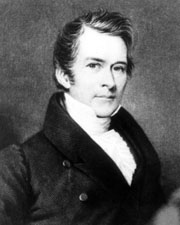John M. Berrien
John Macpherson Berrien | |
|---|---|
 | |
| United States Senator from Georgia | |
| In office March 4, 1841 – May 28, 1852 (temporarily resigned his seat from May 1845 to November 1845) | |
| Preceded by | Wilson Lumpkin |
| Succeeded by | Robert M. Charlton |
| 10th United States Attorney General | |
| In office March 9, 1829 – June 22, 1831 | |
| President | Andrew Jackson |
| Preceded by | William Wirt |
| Succeeded by | Roger B. Taney |
| United States Senator from Georgia | |
| In office March 4, 1825 – March 3, 1829 | |
| Preceded by | John Elliott |
| Succeeded by | John Forsyth |
| Member of the Georgia Senate | |
| In office 1822-1823 | |
| Personal details | |
| Born | August 23, 1781 Rocky Hill, New Jersey |
| Died | January 1, 1856 (aged 74) Savannah, Georgia |
| Political party | Whig |
| Spouse(s) | Eliza Richardson Anciaux (b. September 19, 1783 at Newport, RI; d. August 27, 1828) Eliza Cecil Hunter |
John Macpherson Berrien (August 23, 1781 – January 1, 1856) of Georgia was a United States senator and Andrew Jackson's Attorney General.
Biography
Born at Rocky Hill, New Jersey, to a family of Huguenot ancestry, Berrien moved with his parents to Savannah, Georgia, in 1782; was graduated from Princeton College in 1796; studied law in Savannah; was admitted to the bar at the age of 18, and began practice in Louisville, Georgia, in 1799. After he returned to Savannah he was elected solicitor of the eastern judicial circuit of Georgia in 1809; judge of the same circuit from 1810 until January 30, 1821, when he resigned. He served as captain of the Georgia Hussars, a Savannah volunteer company, in the War of 1812.
Berrien was a member of the Georgia Senate from 1822 to 1823. He was elected as a Jacksonian Democrat to the United States Senate and served from March 4, 1825. In 1824, in The Antelope case he argued against the freedom of slaves captured at sea noting slavery "lay at the foundation of the Constitution" and that slaves "constitute the very foundation of your union".[1] On March 9, 1829, he resigned from the Senate to accept the position of Attorney General in the Cabinet of President Andrew Jackson. He held that post from March 9, 1829, until June 22, 1831, when he resigned. After leaving the Cabinet he resumed the practice of law until he was again elected, as a Whig, to the U.S. Senate and served from March 4, 1841, until May 1845, when he again resigned to accept an appointment to the supreme court of Georgia; again elected in 1845 to the United States Senate to fill the vacancy caused by his second resignation; reelected in 1846 and served from November 13, 1845, until May 28, 1852, when he resigned for the third time.
Berrien's views on sectional issues hardened during his tenure in the Senate and he became aligned with the short-lived Southern Rights Party formed to oppose the Compromise of 1850 and the Wilmot Proviso.
During the 1820s, Berrien was a member of the prestigious society, Columbian Institute for the Promotion of Arts and Sciences, which counted among its members former presidents Andrew Jackson and John Quincy Adams and many prominent men of the day, including well-known representatives of the military, government service, medical and other professions.[2]
He served as the chairman of the U.S. Senate Committee on the Judiciary in the 20th, 26th and 27th Congresses. He was president of the American Party convention at Milledgeville in 1855; and died in Savannah on January 1, 1856. He is interred in Laurel Grove Cemetery.
He was also a slave owner. In 1830, he owned 90 slaves.[3] In 1840, he owned 8 slaves at his house in Savannah, Georgia,[4] and an additional 140 slaves in surrounding Chatham County.[5] In 1850, he owned 143 slaves.[6]
Legacy
Berrien County, Georgia, and Berrien County, Michigan (one of Michigan's Cabinet Counties, organized during his term as attorney general), are named in his honor.
References
- ^ Fateful Lightning: A New History of the Civil War and Reconstruction; by Allen C. Guelzo, May 18, 2012, kindle location 935
- ^ William Dawson Johnson (1904). History of the Library of Congress: Volume I, 1800–1864, Volume 1. Retrieved 2015-01-06.
- ^ 1830 United States Census, United States census, 1830; Cherokee Hill District, Chatham, Georgia;. Retrieved on 6 March 2016.
- ^ 1840 United States Census, United States census, 1840; Savannah, Georgia;. Retrieved on 6 March 2016.
- ^ 1840 United States Census, United States census, 1840; District 8, Chatham, Georgia;. Retrieved on 6 March 2016.
- ^ "1850 United States Census,Slave Schedules", United States census, 1850; District 13, Chatham, Georgia;.
Biography
- United States Congress. "John M. Berrien (id: B000413)". Biographical Directory of the United States Congress.
- 1781 births
- 1856 deaths
- People from Rocky Hill, New Jersey
- People from Savannah, Georgia
- American people of the War of 1812
- Georgia (U.S. state) lawyers
- Georgia (U.S. state) State Senators
- Georgia (U.S. state) state court judges
- United States Attorneys General
- United States Senators from Georgia (U.S. state)
- Princeton University alumni, 1790–99
- Georgia (U.S. state) Whigs
- Georgia (U.S. state) Jacksonians
- Whig Party United States Senators
- Jackson administration cabinet members
- Erasmus Hall High School alumni
- People from Louisville, Georgia
- Slave owners



